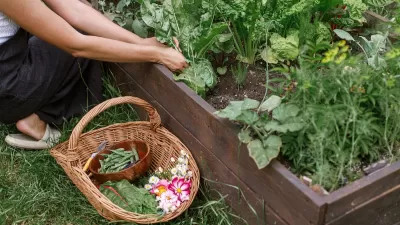Farm land ownership matters on the edges of metropolitan areas, where farmers can find lucrative markets for their products and yet, with ever escalating land prices, face daunting odds in securing land to grow on or even to get started.
By David Holtzman
I have thought a lot lately about the issue of land ownership for farmers, and the barriers they face to buying land so they can plan for growing their business and serving more food consumers.
This issue really matters on the edges of metropolitan areas, where farmers can find lucrative markets for their products and yet, with ever escalating land prices, face daunting odds in securing land to grow on or even to get started. Many farmers settle for a lease instead, which sometimes only lasts a couple years before the relationship between owner and farmer sours.
It's interesting to see that control of land for farming is an issue in urban agriculture, as well. At a recent farming conference in Richmond, Va., a board member of the Urban Agriculture Collective of Charlottesville [UACC] talked about a city-sponsored plan to redevelop her neighborhood, which would include relocating the farm she and her neighbors have worked on for seven years.
Community gardens have fallen victim to a lack of land tenure before, notably in New York City where former Mayor Rudolph Giuliani took many neighborhood gardens back for redevelopment in the late 1990s. (Successive mayors have carried on the trend he started.) Many politicians (and their developer friends) see agriculture as merely a cute placeholder until the time is ripe for construction.
In Charlottesville's case, the area proposed for redevelopment was renewed once before, in the 1960s, during the height of Urban Renewal across the country. The new plan calls for mixed-income housing rather than affordable housing, which naturally has long-time residents worried that the fabric of their community will be destroyed. Their concerns were magnified when the city made what to them was a token effort to involve them in the public process.
The interesting twist is the presence of the farm...
FULL STORY: Control of Farmland, City Style

Alabama: Trump Terminates Settlements for Black Communities Harmed By Raw Sewage
Trump deemed the landmark civil rights agreement “illegal DEI and environmental justice policy.”

Planetizen Federal Action Tracker
A weekly monitor of how Trump’s orders and actions are impacting planners and planning in America.

The 120 Year Old Tiny Home Villages That Sheltered San Francisco’s Earthquake Refugees
More than a century ago, San Francisco mobilized to house thousands of residents displaced by the 1906 earthquake. Could their strategy offer a model for the present?

Ken Jennings Launches Transit Web Series
The Jeopardy champ wants you to ride public transit.

BLM To Rescind Public Lands Rule
The change will downgrade conservation, once again putting federal land at risk for mining and other extractive uses.

Indy Neighborhood Group Builds Temporary Multi-Use Path
Community members, aided in part by funding from the city, repurposed a vehicle lane to create a protected bike and pedestrian path for the summer season.
Urban Design for Planners 1: Software Tools
This six-course series explores essential urban design concepts using open source software and equips planners with the tools they need to participate fully in the urban design process.
Planning for Universal Design
Learn the tools for implementing Universal Design in planning regulations.
Clanton & Associates, Inc.
Jessamine County Fiscal Court
Institute for Housing and Urban Development Studies (IHS)
City of Grandview
Harvard GSD Executive Education
Toledo-Lucas County Plan Commissions
Salt Lake City
NYU Wagner Graduate School of Public Service




























